|
Featured picture tools: |
These featured pictures, as scheduled below, appeared as the picture of the day (POTD) on the English Wikipedia's Main Page in February 2011. Individual sections for each day on this page can be linked to with the day number as the anchor name (e.g. [[Wikipedia:Picture of the day/February 2011#1]] for February 1).
You can add an automatically updating POTD template to your user page using {{Pic of the day}} (version with blurb) or {{POTD}} (version without blurb). For instructions on how to make custom POTD layouts, see Wikipedia:Picture of the day.Purge server cache
February 1

|
An engraving made from a daguerreotype of Ira Aldridge (1807–1867) in the role of Aaron from William Shakespeare's Titus Andronicus. Aldridge was an African American actor who made his career largely in Europe due to persistent racism in the United States. He began acting with the African Grove theatre in New York City, and moved to London in the early 1820s, where he soon began receiving critical acclaim for his performances, most notably for Othello. He then was cast in several roles of specifically white characters, such as the title role in Richard III, and Shylock in The Merchant of Venice. He was so renowned that he is the only African American to be included among the 33 actors honored at the Royal Shakespeare Theatre at Stratford-upon-Avon. Daguerreotype: William Paine; Image: London Printing and Publishing Co; Restoration: Adam Cuerden |
February 2

|
A view of Cape Raoul on the southwestern corner of the Tasman Peninsula. The peninsula is at the southeastern end of Tasmania, Australia, and is connected to the Forestier Peninsula via an isthmus known as Eaglehawk Neck. The Tasman Peninsula is home to Tasman National Park and the former penal colony of Port Arthur, Tasmania's top tourist attraction. The region is also the key area in the battle to save the Tasmanian Devil from a parasitic cancer called devil facial tumour disease. Photo: JJ Harrison
Recently featured:
|
February 3
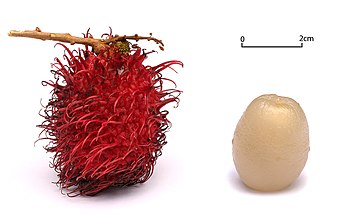
|
An unpeeled and a peeled rambutan, the fruit of the rambutan tree. The plant is native to the Malay Archipelago and can be found through much of Southeast Asia, although its exact distribution remains unknown. The name is derived from the Malay word rambut, which literally means 'hairy'. The fruit flesh is translucent, whitish or very pale pink, with a sweet, mildly acidic flavour. Photo: Muhammad Mahdi Karim
Recently featured:
|
February 4

|
A late 1930s Federal Art Project poster advertising the bobsled track in Lake Placid, New York, United States, which had been used in the 1932 Winter Olympics. The village is located in the Adirondack Mountains and is known as a tourist destination for winter sports, mountain climbing, and golf. It is one of the three places to have twice hosted the Winter Olympic Games and the first location in North America to host two Olympic games. Restoration: Lise Broer
Recently featured:
|
February 5
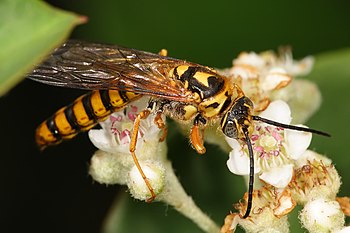
|
A male Tiphiid wasp (Agriomyia sp.), feeding on nectar. Although the adults are nectarivores, the larvae are almost universally parasitoids of various beetle larvae. A female wasp will paralyze the victim and lay an egg on it. When the egg hatches, the wasp larva has a ready supply of food. As some of the scarab species attacked by tiphiids are pests, some of these wasps are considered beneficial as biological control agents. Photo: Fir0002
Recently featured:
|
February 6

|
Ronald Reagan (1911–2004) was an actor-turned-politician who served as the 40th president of the United States (1981–1989) and the 33rd governor of California (1967–1975). Reagan was born in Tampico, Illinois, and moved to Los Angeles, California, in 1937. As an actor, he appeared in over 50 films and served as president of the Screen Actors Guild. He turned to politics in the mid-1960s, winning the 1966 and 1970 gubernatorial elections. He failed in his presidential bids in 1968 and 1976, but finally won both the Republican nomination and election in 1980 and again in 1984. Photo: United States government
Recently featured:
|
February 7

|
A nesting Jacky Winter (Microeca fascinans), a passerine bird native to Australia and Papua New Guinea. It was previously known as the Brown Flycatcher, but is more closely related to crows than to true flycatchers. Its natural habitats are temperate forests, subtropical or tropical dry forests, and Mediterranean-type shrubby vegetation. Photo: Fir0002
Recently featured:
|
February 8

|
American baseball pitcher Andy Pettitte during his time as a member of the New York Yankees. Pettitte, now retired, holds the record for most postseason wins in Major League Baseball history with 19. He won five championships with the Yankees, and in all five he was the winning pitcher in the final game. Pettitte began his pitching career with the Yankees and spent the majority of his playing years with them, though he also spent three years with the Houston Astros. Photo: Keith Allison
Recently featured:
|
February 9

|
The flower of a Dahlia hybrid. Dahlias, named after Swedish 18th-century botanist Anders Dahl, are bushy, tuberous, perennial plants native to Mexico, Central America, and Colombia. There are at least 36 species of dahlia, and dahlia hybrids are common garden plants. Photo: Muhammad Mahdi Karim
Recently featured:
|
February 10

|
The Washington, D.C., bureau office of the Brooklyn Eagle, a defunct newspaper that was published in Brooklyn, New York, from 1841 to 1955 and from 1960 to 1963. At one point, it was the most popular afternoon newspaper in the United States, and Walt Whitman served as its editor for two years. In 1996, the name was revived once again for a new daily newspaper. Photo: Harris & Ewing; Restoration: Lise Broer
Recently featured:
|
February 11

|
A head crash is a hard-disk failure that occurs when a read–write head of a hard disk drive comes in contact with its rotating platter, resulting in damage to the magnetic media on the platter surface and usually leaving the data unrecoverable. The damage is visible here as a circular mark. A head crash can be initiated by dirt or by excessive shock or vibration. Photo: Alchemist-hp
Recently featured:
|
February 12

|
On February 12, 1988, the U.S. Navy cruiser USS Yorktown, while exercising the "right of innocent passage" through Soviet territorial waters, was intentionally rammed by the Soviet frigate Bezzavetniy (collision pictured) with the intention of pushing the Yorktown into international waters. This action has been called "the last incident of the Cold War". Photo: United States Navy
Recently featured:
|
February 13

|
A camouflaged female wolf spider, from the Lycosoidea superfamily, carrying her young on her back. Wolf spiders are robust and agile hunters with good eyesight. They are unique in the way that they carry their eggs. The egg sac, a round silken globe, is attached to the spinnerets at the end of the abdomen, allowing the spider to carry her unborn young with her. Photo: Muhammad Mahdi Karim
Recently featured:
|
February 14
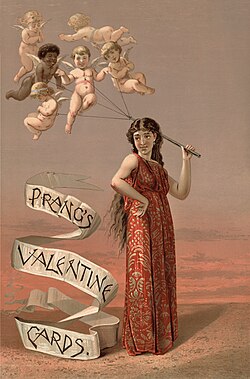
|
An 1883 lithographed advertisement for Valentine's Day greeting cards published by Louis Prang, showing a woman holding a group of tethered cherubs, who float like a bunch of balloons above her. Prang became well-known during the American Civil War, printing war maps for newspapers. In 1873, he began selling Christmas cards in England and brought them to the United States the following year, earning him the moniker "father of the American Christmas card". Restoration: Lise Broer
Recently featured:
|
February 15
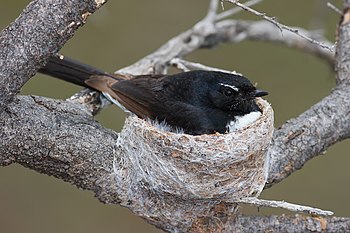
|
A female Willie Wagtail (Rhipidura leucophrys), a passerine bird native to Australasia. The Willie Wagtail is a common and familiar bird throughout much of its range. Males and females are coloured with almost entirely black upperparts and white underparts. The common name is derived from its habit of wagging its tail horizontally when foraging on the ground. Photo: Fir0002
Recently featured:
|
February 16

|
Joe Oakley (right), being penalised by the official (centre) for "dabbing" his foot on the ground during a mountain bike trials competition. Trials riding is a mountain biking discipline in which the rider attempts to pass through an obstacle course without setting foot to ground. Originating in Catalonia, it is popular within Europe and has a small following worldwide. Photo: Steve Bennett
Recently featured:
|
February 17
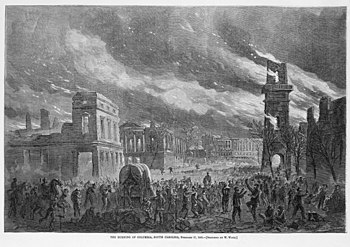
|
The Capture of Columbia occurred February 17–18, 1865, during the Carolinas Campaign of the American Civil War. The state capital of Columbia, South Carolina, was captured by Union forces under Maj. Gen. William T. Sherman, and much of the city was burned. Artist: William Waud; Restoration: Adam Cuerden
Recently featured:
|
February 18

|
An elaborate sand sculpture display at the Sand Sculpting Australia "Dinostory" festival. Sand sculpting as an art form has become very popular in recent years especially in coastal beach areas. Hundreds of annual competitions are held all over the world. Techniques can be quite sophisticated, and record-breaking achievements have been noted in the Guinness World Records. Photo: John O'Neill
Recently featured:
|
February 19

|
A conopid fly (species unidentified). Also known as "thick-headed flies", the majority of conopids are black and yellow, or black and white, resembling wasps or bees. They may be easily confused with hoverflies, which are also notable mimics. The larvae of all conopids are parasitoids, most of aculeate (stinging) Hymenoptera. Photo: Fir0002
Recently featured:
|
February 20

|
Dale Earnhardt, Jr.'s Hendrick Motorsports pit crew execute a pit stop at a Sprint Cup Series competition at Darlington Raceway, South Carolina, in May 2008. In motor sport, pit stops are when the racing vehicle gets more fuel, new wheels, repairs, mechanical adjustments, a driver change, or any combination of the above. Photo: United States National Guard
Recently featured:
|
February 21
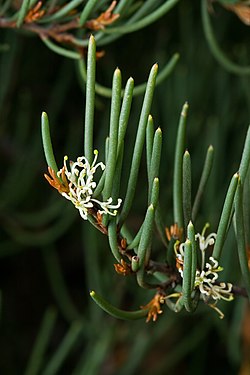
|
Leaves and flowers of Hakea epiglottis, one of 149 species in the Hakea genus of shrubs and trees. Hakeas, native to Australia, are popular ornamental plants and in many locations are as common as grevilleas and banksias. Photo: JJ Harrison
Recently featured:
|
February 22
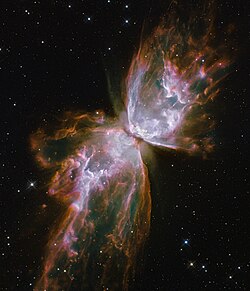
|
NGC 6302 is a bipolar planetary nebula in the constellation Scorpius. Its central star, a white dwarf that was only recently discovered, is one of the hottest stars in the galaxy, with a surface temperature in excess of 200,000 K, implying that the star from which it formed must have been very large. The central star had escaped detection because of a combination of its high temperature, a dense gaseous and dusty equatorial ring that surrounds it, and the bright background from the star itself. It was not until the Wide Field Camera 3 on the Hubble Space Telescope came into operation that astronomers were able to observe it. Photo: NASA, ESA and the Hubble SM4 ERO Team
Recently featured:
|
February 23

|
|
A 360° panorama of the view from Mount Ellinor in the Olympic Mountains of Washington, US. Landmarks from left to right include Hood Canal in Puget Sound, Lake Cushman, the lightly forested summit of Ellinor, and Mount Washington. Photo: Gregg M. Erickson |
February 24

|
Nardwuar the Human Serviette is a Canadian celebrity interviewer and musician. Born John Ruskin, he legally changed his name in 1986. His interview style is eccentric and will often confuse or anger his interviewees, although others will play along. He has also attended press conferences to ask surreal questions. As a musician, he is the lead singer and keyboardist for The Evaporators and has contributed to the UNICEF benefit song "Do They Know It's Hallowe'en?" Photo: William Jans
Recently featured:
|
February 25
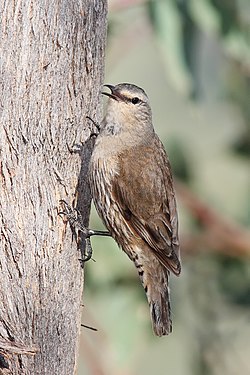
|
The Brown Treecreeper (Climacteris picumnus) is the largest species of Australasian treecreeper. It is endemic to forests and woodlands of the Great Dividing Range in eastern Australia. As the name implies, its colour is pale brown to grey-brown, with black streaking on the underparts and black bars on the undertail, with almost no sexual dimorphism. Although the International Union for Conservation of Nature considers the Brown Treecreeper a "Least Concern" species, one subspecies found in New South Wales is rated threatened by Australian authorities. Photo: Fir0002 |
February 26

|
|
A panoramic view of Fort Baker, a former United States Army post located across the Golden Gate from San Francisco, California, with Angel Island and sea fog in the background. Fort Baker was one of a number of military installations on the U.S. Pacific Coast built for seacoast defense. The U.S. government acquired the land in 1866, and the fort was used by Army units until 2000. Photo: Mila Zinkova
Recently featured:
|
February 27
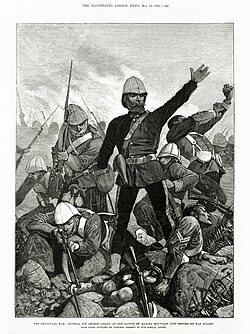
|
The Illustrated London News's depiction of Major-General Sir George Pomeroy Colley of the British Army at the Battle of Majuba Hill, which was fought on 27 February 1881 near Volksrust, South Africa, during the First Boer War. The battle was the third successive victory for the South African Republic and led to the signing of the Pretoria Convention to end the war. Colley was the first governor of the Colony of Natal as well as High Commissioner for South Eastern Africa. He was killed during the battle. Artist: Melton Prior; Restoration: Adam Cuerden
Recently featured:
|
February 28

|
Sharpshooters (Oncometopia orbona pictured) are leafhoppers that belong to the tribe Proconiini. Both nymphs and adults feed on a variety of plant species by filtering a huge volume of dilute liquid through their digestive system to extract the trace nutrients. Much of the water and carbohydrates are then squirted forcibly away from the body in a fine stream of droplets, thus earning them their common name. Photo: Ryan Kaldari |
Picture of the day archives and future dates